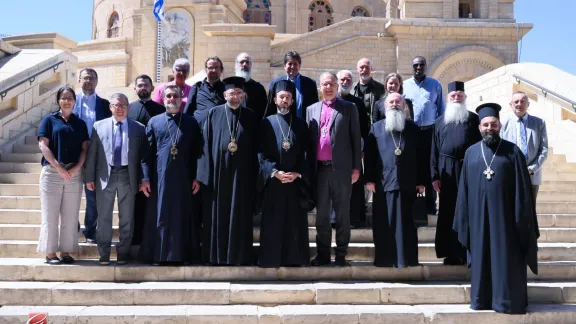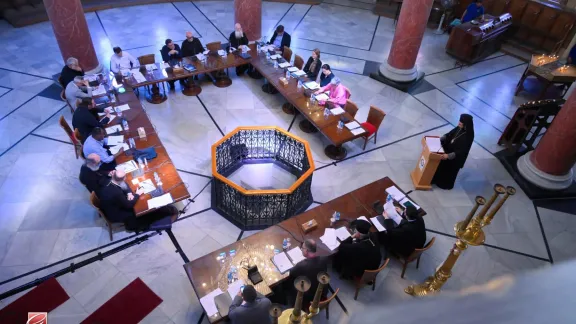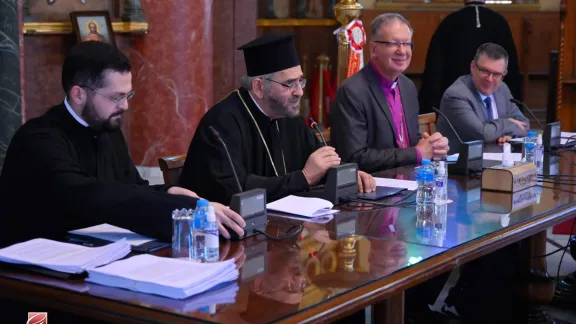
Members of the International Lutheran-Orthodox Joint Theological Commission at work in the Patriarchal monastery of St George in the old city of Cairo, Egypt. Photo: George Adib
Joint statement on wording of Nicaean Creed marks major step towards healing centuries of division
(LWI) - Three little words (just one in the original Latin) that have divided the East and Western churches for centuries, are at the heart of a new, ground-breaking agreement that its authors hope could usher in a new era of reconciliation and mark a significant step on the road towards Christian unity.
At a May meeting in Cairo, Egypt, of the International Lutheran-Orthodox Joint Theological Commission between the Lutheran World Federation (LWF) and the Orthodox Church, both sides revisited a sixth century rewording of the Nicene Creed and agreed that the use of the original Greek text should be encouraged in all churches.
Using the dialogue process of ‘differentiated consensus’, they drew up a joint statement that revealed “a fundamental rapprochement on the concept of the relationship between the Son and the Spirit.” The decision was agreed upon “in the hope that this will contribute to the healing of age-old divisions between our communities and enable us to confess together the faith of the Ecumenical Councils of Nicaea and Constantinople.”
Renewed reflection on the Trinity
The divisions centered on the addition by Western Church of the Latin word ‘filioque’ (in English ‘and the Son’) to the original text of the Creed describing the origin of the Holy Spirit. For the Orthodox Church, this addition represented a distortion of the doctrine of the Trinity. Despite attempts at reconciliation, the Eastern and Western churches broke apart in the schism of 1054 - a schism that remains in effect to this day.

Members of the International Lutheran-Orthodox Joint Theological Commission at work in the Patriarchal monastery of St George in the old city of Cairo, Egypt. Photo: George Adib
In their Cairo meeting, participants noted that the churches of the Reformation inherited the Creed in the Western tradition without considering it problematic. Today, however, in light of the upcoming 1,700th anniversary of the Council of Nicaea, participants agreed it is time to reconsider what the addition of those words implies and how a path towards reconciliation may be opened. The statement proposes that a renewed focus on the original wording of the Creed “may encourage renewed theological reflection on the Trinity and role of the Holy Spirit.”
“Lutherans and Orthodox have taken a major step towards one another in this statement,” notes LWF’s Assistant General Secretary for Ecumenical Relations Prof. Dr Dirk G. Lange. “The LWF is building on a vote taken at our 1990 Curitiba Assembly which said the ‘filioque’ could be left out in ecumenical settings. But now we want to encourage Lutheran churches to consider a wider use of the original form of the Nicene-Constantinopolitan Creed in order to deepen our Trinitarian reflection.”

From left to right, Deacon Œcumenius Amanatidis, Metropolitan Prof. Kyrillos of Krini, Bishop Johann Schneider and Prof. Dr Dirk Lange, the co-chairs and co-secretaries of the International Lutheran-Orthodox Joint Theological Commission. Photo: George Adib
We hope it can provide an important ecumenical incentive and open the way for other Western churches to move towards reconciliation.
Prof. Dirk Lange, LWF Assistant General Secretary for Ecumenical Relations and co-secretary of the International Lutheran-Orthodox Joint Theological Commission.
“For the Orthodox, it is also a big step to recognize that the use of the ‘filioque’, as meaning ‘through the Son’, is attested in patristic theology and therefore should no longer be a church dividing issue,” Lange continues. “The LWF has taken this major step towards retrieving the original version of this Creed, based on a differentiated consensus. We hope it can provide an important ecumenical incentive and open the way for other Western churches to move towards reconciliation.”
A key question remains of how to ‘grassroot’ this historic agreement within both Lutheran and Orthodox churches. “Reception at local level is vital,” Lange says, “so that these important developments don’t just remain on paper but serve to bring people closer together, especially as we look forward to celebrating together the 1,700th anniversary of the first Ecumenical Council of Nicaea next year.”
At a 13 to 18 June meeting in Geneva, the LWF Council welcomed the statement and recommended that the Communion Office produce teaching materials about it for use in parishes and educational institutes. Council members also recommended that local Lutheran congregations “seek intentional engagement and closer relationships with Orthodox neighbors.”
At their Cairo meeting, the Commission members also issued a second joint statement on the Holy Spirit, the Church and the World, offering theological reflections on the third person of the Trinity in Creation, in the liturgy and in the work of the churches in contemporary society.


